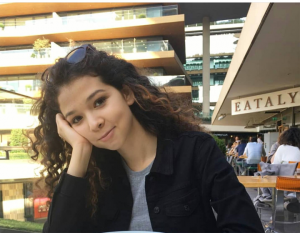
BY ŞEBNEM TÜRE (PSYC/II) sebnem.ture@ug.bilkent.edu.tr
Minimalism is a form of abstract art developed in the USA in the 1960s. We often call a painting “minimalist” when it has plain colors and simple geometric shapes. And then there are also “minimalists,” who have adapted this art movement into a lifestyle. Minimalism today is a philosophy that values having a thoughtful perspective about what we prioritize. Aiming for a simpler ambience, with fewer things to focus on, it’s a way of turning your life into a piece of art that’s soothing to look at.
It was not soothing to look at my brother’s new house when his family first moved in with all those boxes full of clothing, toys, shoes, kitchen items and many, many other things. For a week they tried to get settled, to find a place for everything that they had, and that wasn’t an easy job. The same week, I saw the film “Minimalism: A Documentary About the Important Things” from director Matt D’Avella. What my brother had was a dream house that wasn’t fully comforting because of what he had brought with him. All this made me question what I own and whether I needed all the things that I live with.
Minimalism of course is not living in a house that’s empty, throwing away everything you have, or wearing only simple clothes like a monk. Rather, it’s about that process of questioning what we own so that things don’t become a part of who we are, making us feel attached to them.
Today’s society, however, forces us to consume. Since you’re here in September, you’ve probably seen the “back to school” discounts; you may have already bought a few things, which is also fine. If you need an item and it’s on sale at a discount, it’s a perfect match. But on the other hand, when something is on sale, we don’t always need to buy it. Whether explicitly or implicitly, this is something we struggle with, and in order to move away from society’s directive to consume, we need to think more about the value of things.
The value of an item may be different than how it’s advertised to us. After decluttering my room, I observed that everyone has one item that s/he has a lot more of than s/he needs, and for me the first item I noticed in this context was my t-shirts. The issue with all the t-shirts is that they were cheap and easy to find. There are brands or even clothing bazaars that provide clothes that are affordable, that are made of cheap material, and we don’t even think about the fact that they’re of low quality. This is how today’s “fast fashion” industry works, but there are also costs. The industry is responsible for high carbon emissions and wastewater production, and it’s said to be second only to oil as the world’s largest polluter. All the items that we bought thinking they were cheap also entailed human costs, with the workers who produced them enduring unsafe working conditions and extremely long hours for minimal pay.
The real value of many items in social and environmental terms is less than we think it is. Knowing this can help us be more thoughtful when we shop – but what about the things we already have, and that now have a personal value for us? When it comes to freeing up space from all our excess possessions, Maire Kondo, a Japanese author, has a method than can help us.
She suggests looking at all the items we have and considering whether or not they bring us joy. As you use this method, you start to distinguish what’s actually valuable to you and what you don’t really need. If you can declutter this way, you end up with all your favorite items.
Alternatively, you can take up a challenge such as Project 333, in which you decide on 33 items of clothing that you’ll wear for the next three months, and then basically give away or store everything else. In my view, it’s not a must to force yourself to undertake challenges or go to extremes with minimalism. Nonetheless, all the methods and challenges that are out there can help you understand how now that you have less, you have more. So, we hear many people who have minimalist lifestyles saying that they can actually think of more outfits to wear now that they have fewer clothes, and that they feel so much freer in their personal space, which enables them to be more productive and gives them more time for what’s actually important.
It’s also important to note that minimalism is not an overwhelming process of continually thinking about possessions and their value. It has more to do with thinking about those things that are better than material possessions. You can apply minimalism to many aspects of your life, and it will help you bring all of them into focus. Having fewer but meaningful friendships, or spending less time on social media when it’s not that important. Prioritizing what’s more valuable to you as you apportion your time. Decluttering the thoughts in your mind and throwing out what’s actually harming you.
The start of a new semester can be an invitation for us to again think about all of this and practice self-evaluation through a more minimalist way of living.
